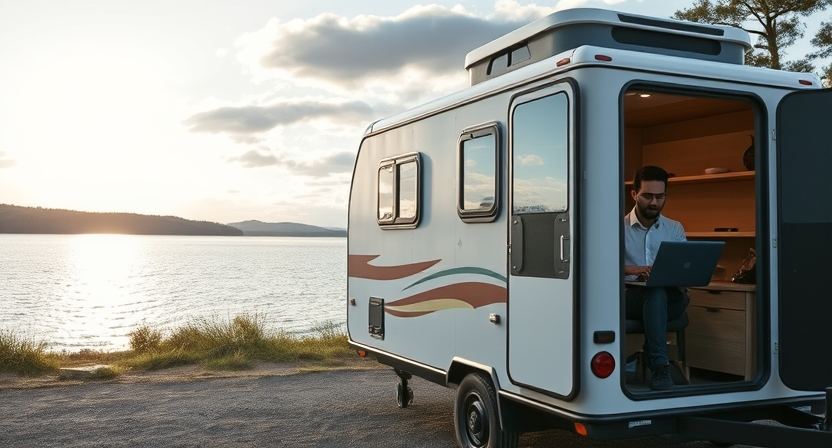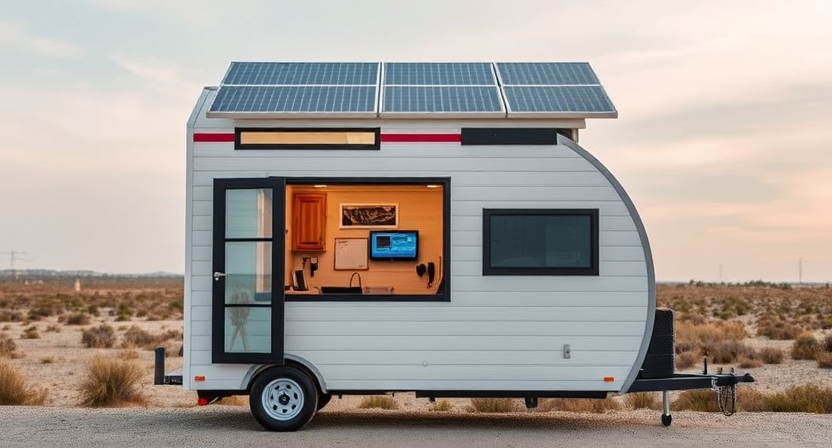Tiny Office on Wheels: A Modern Solution for Remote Work In the age of remote work and flexible lifestyles, a Tiny Office on Wheels offers a unique and innovative way to stay productive while embracing mobility. These compact, portable offices combine functionality with freedom, making them an ideal choice for professionals, entrepreneurs, and digital nomads. In this guide, we explore the features, benefits, costs, and practical considerations of tiny mobile offices, along with inspiring visuals to help you design your perfect workspace.
What is a Tiny Office on Wheels?
A tiny office on wheels is a fully equipped workspace built into a portable structure, often mounted on a trailer or chassis. Designed for mobility, these offices are perfect for remote work, creative projects, or even as a mobile studio. They provide all the essentials of a traditional office, packaged into a compact and movable form.
Features of a Tiny Office on Wheels
1.Efficient Use of Space:
- Smart layouts with built-in desks, shelves, and seating options.
- Compact design ensures every inch is optimized for productivity.
2.Mobility and Versatility:
- Mounted on wheels for easy relocation.
- Suitable for various settings, from urban environments to rural landscapes.
3.Tech-Ready Setup:
- Equipped with power outlets, internet connectivity, and energy-efficient lighting.
- Options for solar panels to support sustainable energy use.
Benefits of a Tiny Office on Wheels

1.Flexibility:
- Move your office to different locations as needed.
- Ideal for those who enjoy working in changing environments.
2.Cost-Effective:
- More affordable than renting or owning a traditional office space.
- Minimal maintenance and operational costs.
3.Work-Life Balance:
- Separate workspace from living areas, even in small living setups.
- Encourages focus and productivity.
Costs and Financing Options
The cost of a tiny office on wheels can vary based on size, materials, and customization. Here’s a general breakdown:
Basic Models: $10,000–$25,000
Luxury Models: $30,000–$50,000
Financing Options:
Personal loans or small business loans.
Manufacturer payment plans.
Crowdfunding for creative or community-focused projects.
Practical Considerations

1.Zoning and Permits:
- Ensure compliance with local zoning laws and regulations for portable structures.
- Obtain necessary permits if using as a commercial space.
2.Customization:
- Choose designs that suit your specific needs, such as soundproofing for privacy or additional storage.
3.Energy and Connectivity:
- Plan for power sources, including solar options or generator backups.
- Ensure reliable internet connectivity through mobile hotspots or satellite services.
Inspiration: Tiny Office on Wheels in Action
Freelancers: A creative space for writers, designers, and developers.
Entrepreneurs: A mobile headquarters for running a small business.
Artists: A portable studio for painting, photography, or crafting.
Image Prompt: A mobile office parked at a bustling cityscape, showcasing its versatility for urban professionals.
Conclusion
A Tiny Office on Wheels is more than just a workspace; it’s a lifestyle choice that embraces freedom, efficiency, and sustainability. Whether you’re a remote worker, a small business owner, or a creative professional, this innovative solution can help you achieve the perfect balance between work and life. Explore the possibilities and transform your work experience today!
FAQs About Tiny Office on Wheels
Q1: What size options are available for tiny offices on wheels? A: Sizes vary, but most tiny offices range between 80–200 square feet. Custom designs can cater to specific space requirements.
Q2: Are tiny offices on wheels weatherproof? A: Yes, most are built with insulation and durable materials to withstand various weather conditions. Additional features like HVAC systems can be added for comfort.
Q3: Can I customize my tiny office? A: Absolutely! You can customize layouts, materials, and features like built-in desks, solar panels, and soundproofing to meet your needs.
Q4: Where can I park my tiny office? A: Tiny offices can be parked on private property, RV parks, or co-working spaces that allow mobile units. Always check local zoning laws.
Q5: How much does maintenance cost? A: Maintenance is generally low, with costs mainly for cleaning, minor repairs, and periodic checks on utilities and mobility features.
Recent Posts

Anthony is a professional home designer known for creating stylish, functional, and innovative living spaces. With a keen eye for detail and a passion for aesthetics, he transforms ideas into reality, ensuring every home reflects elegance, comfort, and personality. His expertise brings dream homes to life with creativity and precision.
